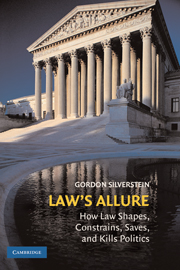Book contents
- Frontmatter
- Contents
- Acknowledgments
- LAW'S ALLURE
- Introduction: Law's Allure: The Juridification of American Politics and Public Policy
- PART I LAW'S ALLURE: WHY, WHY NOW, AND WHY IT MATTERS
- 1 Motives, Incentives, Patterns, and Process
- 2 Why Now? From May and May Not – To Must
- 3 Law Is Different: The Power of Precedent
- PART II LAW'S ALLURE: PATTERNS, PROCESS, AND CAUTIONARY TALES
- PART III LAW'S ALLURE: COSTS AND CONSEQUENCES
- Conclusion: The Promise and Peril of Law's Allure
- Bibliography
- Index
- References
2 - Why Now? From May and May Not – To Must
Published online by Cambridge University Press: 05 June 2012
- Frontmatter
- Contents
- Acknowledgments
- LAW'S ALLURE
- Introduction: Law's Allure: The Juridification of American Politics and Public Policy
- PART I LAW'S ALLURE: WHY, WHY NOW, AND WHY IT MATTERS
- 1 Motives, Incentives, Patterns, and Process
- 2 Why Now? From May and May Not – To Must
- 3 Law Is Different: The Power of Precedent
- PART II LAW'S ALLURE: PATTERNS, PROCESS, AND CAUTIONARY TALES
- PART III LAW'S ALLURE: COSTS AND CONSEQUENCES
- Conclusion: The Promise and Peril of Law's Allure
- Bibliography
- Index
- References
Summary
The american system is remarkably legalistic and has been from the start. In a constitutional system of limited government, someone or some institution is needed to define and interpret those limits. And in a complex federal system, in which power is fragmented among national, state, and local governments, and subdivided again within each into executive, legislative, and judicial institutions, the power to say what is – and what is not – allowed is far from trivial. Though not explicitly provided for in the Constitution and, with only a few exceptions, not widely debated in the Constitutional Convention in 1787 nor in the ratification debates, the courts were well designed to assume this role: to exercise a blocking function, saying what the government can and what it can not do.
The utility of the blocking function is not limited to one faction, one party, or one ideological strain: It has been a great source of central power and nationalization in many eras – and of recalcitrance, resistance, and decentralization in others. Among other things, the Court blocked: states from taxing the national bank, African Americans from full use of the judicial system, the national government from imposing an income tax, national antitrust measures, national efforts to curb child labor, presidential orders seizing steel mills in time of war, prayer in schools, and the use of quotas in affirmative action, to name just a few rulings.
- Type
- Chapter
- Information
- Law's AllureHow Law Shapes, Constrains, Saves, and Kills Politics, pp. 42 - 62Publisher: Cambridge University PressPrint publication year: 2009



